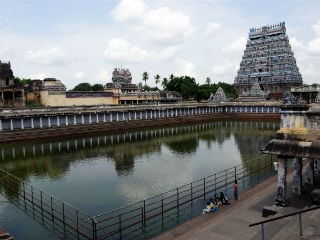 Chennai : The Madras high court has asked that the United Nations Educational, Scientific and Cultural Organisation (Unesco) be involved in the temple restoration project taken up by the Tamil Nadu government. The court has asked the state government to arrange for Unesco’s presence in the court by August 23.
Chennai : The Madras high court has asked that the United Nations Educational, Scientific and Cultural Organisation (Unesco) be involved in the temple restoration project taken up by the Tamil Nadu government. The court has asked the state government to arrange for Unesco’s presence in the court by August 23.
Also, clarifying its earlier directive to Tamil Nadu government to do only ‘essential works’ in ancient temples in the state, the first bench of Chief Justice Sanjay Kishan Kaul and Justice R Mahadevan said it meant the government should not do anything unless it thought any delay would result in the collapse of the ancient structure itself.
A combined reading of the two fiats would mean that the Tamil Nadu government and its officials would now have access to Unesco’s expertise in preserving ancient monuments, and that they should not resort to any mindless ‘restoration works’ which had actually damaged umpteen old temples in the state in the recent past.
It all started on July 5, 2015 when the first bench took suo motu note of the temple heritage issue. After one Srikumar impleaded himself as a party in the case, the high court appointed senior advocate P S Raman as amicus curiae to assist the court in the issue. The senior lawyer, accompanied by Nagaswamy, former director of state archaeological department, Swaminathan, former IIT-Delhi professor and archaeologist Kudavayil Balasubramaniam, inspected several heritage temples and gave reports and suggestions to the court.
On November 30, 2015, the court had asked the state authorities to go slow on the matter of ‘renovation’ till a proper path is laid ahead and not to destroy heritage structures till then. However, activist Rangarajan Narasimhan brought to the court’s notice that the term ‘essential works’ is being misinterpreted by authorities who were going ahead with restoration.
On July 5, 2016 the first bench clarified the term ‘essential works’ and said: “In our view there can be no doubt about what is meant by the expression. This is a reference to works which cannot brook any delay, as the structure itself may collapse in the mean time.”
Earlier, on April 16, 2016, Tamil Nadu government committed a faux pas, when it told the bench that Unesco experts were not available in India. Rangarajan then met Unesco officials in Delhi, and they said their agency had one of the oldest field offices in Delhi, established in 1948. They also said they were in touch with Tamil Nadu government between 2008 and 2010 to study Chettinad heritage.
Referring to this, the first bench has now suggested that Unesco take up a small conservation project as a pilot case. The judges referred to the state government’s stand that the department lacked staff, and said: “Unesco has expressed its willingness to assist the department in undertaking reviewing of institutional mechanism for conservation of temples, and work out the strategy for improvement.”
Posting the matter to August 23, the judges then asked the government to make arrangements for the visit of Unesco experts to the state and examine ancient temples.
The bench has already tagged another PIL by T R Ramesh, president of Temple Worshippers Society, challenging the legality of the Maintenance of Property Rules framed under the HR & CE Act, 1959, to be heard with the heritage cases.
Source : TOI




